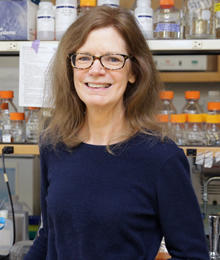An interview with Professor Meg Vickerman
Meg Vickerman is Professor of Microbiology and Immunology at the University at Buffalo, USA. In this interview she tells us more about her research into the oral microbiome, tells us more about the most common oral diseases and how her lab uses genetic and genomic approaches to investigate the balance of healthy bacteria on oral surfaces.

Tell us more about your research?
My lab studies the biology of the multi-species microbial community in the oral cavity with a focus on the pivotal ecological role played by commensal streptococci, such as the model organism Streptococcus gordonii.
We employ genetic and genomic approaches to investigate factors that favour maintaining the ecological balance of healthy bacteria on oral surfaces. Our current focus is on inter-microbial communication and quorum sensing mediated by streptococcal signalling molecules that enhance microbial colonisation, biofilm formation, and the exchange of DNA.
Why is this important?
The most common oral diseases, such as dental caries and periodontal disease, result from a disproportionate growth of pathogenic microbial species arising from multi-species biofilms. Through adhesin-receptor, metabolic, and/or signalling molecule interactions, the commensal streptococci can support the establishment and growth of pathogenic species in oral biofilms, thereby leading to dental disease. The chronic inflammation resulting from these diseases has been associated with increased risks to systemic health.
Additionally, commensal streptococci are gaining attention as potential reservoirs of virulence or resistance determinants that remain quiescent but may become problematic during systemic stresses and may therefore affect disease treatment. Moreover, through actions as benign as chewing, oral streptococci may be dispersed into the bloodstream, and in rare but significant cases cause serious systemic complications such as infective endocarditis.
By developing a better understanding of the biology of the oral streptococci and their communication with potential pathogens, we hope to gain a better understanding of how to maintain a healthy oral microbiome, which in turn has implications for both oral and systemic health.
Why is important to you to volunteer your time and be involved with the Microbiology Society?
I have benefited from the generosity of scientific mentors who have helped guide and support my career. By example, they showed me that working with organisations whose members share a passion for advancing the field of microbiology can be both enjoyable and rewarding. The Microbiology Society's publications and meetings provide a framework for the exchange of scientific ideas that inspire new discoveries.
The Society also fosters the advancement of students and junior investigators to help ensure the future of our field. Scientific societies provide an authoritative voice to educate the public, defend scientific integrity and provide data-based guidance to public policy-makers. I believe that supporting these activities is an important professional responsibility that also contributes to my growth as a scientist.


